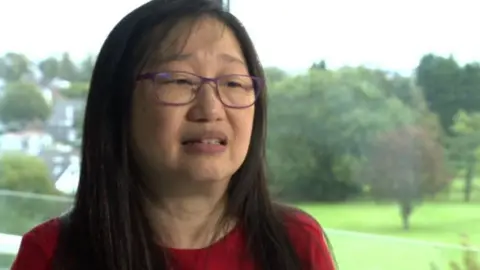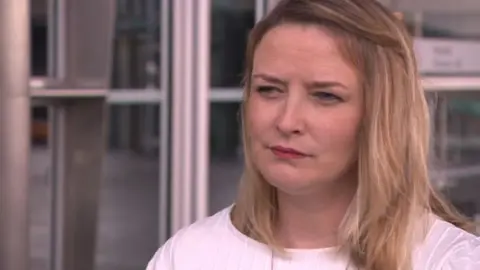Eating disorders: Patients told they are 'not ill enough' for treatment
People with eating disorders are being told they are "not ill enough" for treatment, according to an expert.
In a report, Jacinta Tan found support services were "significantly under-resourced".
She called for investment to ensure eating disorders were identified early to stop people becoming severely ill.
Health Minister Vaughan Gething said he would make sure services were "shaped by the recommendations".
Dr Tan's review was completed in November but only published by the Welsh Government last week.
It said a "major reconfiguration" of services was needed.
And it found there was "patchy provision" of treatment across Wales.
Dr Tan, a consultant psychiatrist with the Aneurin Bevan University Health Board told Wales Live: "The message that most of the patients say that they hear is they are not ill enough to deserve treatment from an eating disorder clinician, and that is absolutely unacceptable, not least because we have more and more research that tells us that the longer patients go without good expert treatment, the harder it's going to be for them to get better."
She said there was a "strong case for significant investment" and called for:
- more specialist clinicians
- a simpler referral process
- three new centres in Wales with outpatient facilities
- waiting time targets of a week in urgent cases and four weeks for others
- GP training to improve recognition, assessment and treatment
- acceptance of "self-referrals" so GPs need not be involved
The review did not recommend a specialist in-patient unit be established in Wales, but said that should be reviewed in five years.

Dr Tan estimated her recommendations would cost more than £9m and involve a significant staffing increase.
Mr Gething said he would ensure services were "shaped by the recommendations".
He has written to health boards asking them for their views on the recommendations.
'Completely drained'

Emily Hoskins was diagnosed with anorexia at 13 and missed years of school.
Now 22, she feels there needed to be better local access to eating disorder therapies and more support for families.
She said anorexia left her so unwell she was "not seeing the outdoors."
She was either in hospital or resting at home.
Ms Hoskins, from Abertillery in Blaenau Gwent, said: "I was completely drained, my skin was frail, my hair was falling out, I was just pale, gaunt, my nails were all a funny colour from where my body wasn't getting the nutrition it needed and then the mental side of it meant that I wasn't playing games, going out with my family."
She could not focus on anything but the disorder.
"I could have been days away from dying," Emily said.
Specialist units in Bridgend and Wiltshire looked after her.
She said she "can't even describe" how hard it was to be away from home.
"Wherever you live in Wales obviously there's differently-populated areas and different counties, but I think one thing I put to the review was that everyone should be treated equally, that we're all struggling with the same sort of illness and the support should be there for everyone.
"You shouldn't have to be offered one thing in one place, and then five minutes down the road, somebody else is offered something completely different".

In his letter Mr Gething asked health boards to "reconfigure services towards earlier intervention" and to develop plans for meeting the four-week waiting time target.
Formal national targets will not be imposed "at this stage".
Health boards have been given £700,000 to make improvements this year, and further annual funding of about £1m will be allocated from next year.
Last month, several people with eating disorders, campaigners and politicians wrote to Mr Gething describing "deep concern" at the lack of action since the report's completion.
Dr Tan said the wait had been "frustrating" but described the government's response as "positive" and "supportive".

Bethan Sayed, chair of the assembly's eating disorders group, said the wait for a government response had been "unacceptably lengthy" and called for "more clarity on funding".
A Welsh Government spokesman said the review required "detailed analysis".
"We have set out the actions we expect to be taken in the short term and will continue to work with health boards, clinicians and patients to ensure that services in Wales move towards the vision set out in the review."
You can see more on this story on Wales Live at 22:35 BST on Wednesday on BBC One Wales and on the BBC iPlayer
